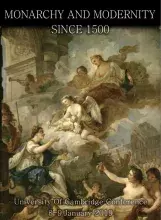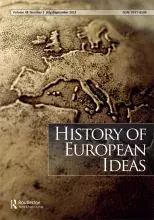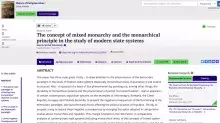A scientific article by Assoc. Prof. Dr. Marcin Michał Wiszowaty in "History of European Ideas"
A scientific article by Assoc. Prof. Dr. Marcin Michał Wiszowaty, entitled "The concept of mixed monarchy and the monarchical principle in the study of modern state systems" has been published in the scientific journal "History of European Ideas" (Taylor & Francis Group).
The article is the aftermath of the International Scientific Conference: "Monarchy and Modernity" organized in 2019 at the Faculty of Law and the Faculty of History of the University of Cambridge.
As we read in the abstract of the paper:
"The paper has three main goals. Firstly - to draw attention to the phenomenon of the democratic paradigm in the study of modern state systems (especially monarchical ones), characterize it and outline its sources. Also - to question the basis of this phenomenon ( by pointing out, among other things, the durability of monarchical systems and the phenomenon of partial 're-monarchization' - real or apparent - of certain contemporary republican systems on the examples of: Montenegro, Romania, the Czech Republic, Hungary and Poland) Secondly, to present the negative consequences of the functioning of the democratic paradigm, also (paradoxically) those affecting the political practice of republics. Thirdly, to propose a way to reduce these negative consequences by changing the optics adopted in comparative studies about monarchies and republics. This change is based on the restoration, in comparative analyzes of contemporary state systems (including monarchical ones), of the concepts of 'mixed system' and 'monarchical principle', which are still used in research on the history of the state and law, and should be disseminated in research on contemporary political systems and constitutional law. An explanation of the terms 'mixed system' and 'monarchical principle' as I use them here will follow in the final part of the paper.
Congratulations to the author. Anyone interested in the subject of monarchical and republican, comparative constitutional law - we invite you to read: http://www.tandfonline.com/doi/full/10.1080/01916599.2023.2233069







